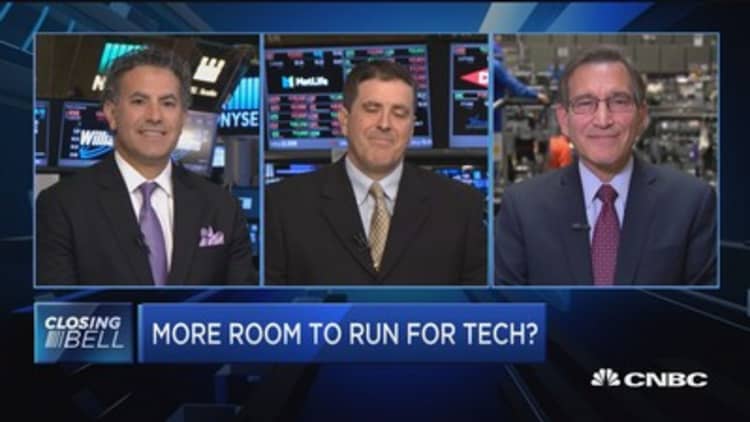
The Dow Jones industrial average and the S&P 500 closed lower on Tuesday after the North Korean ambassador to the UK told Sky News the country will proceed with its sixth nuclear test.
The 30-stock index fell as much as 74.24 points before closing about 40 points lower. The S&P dropped as much as 0.29
"North Korea really doesn't have a way of attacking the U.S. directly other than maybe special forces, teams," said Bruce Bennett, senior defense analyst at Rand Corp. "They may be able to cause some damage within the [Asian] region."
The Nasdaq composite held on to slight gains and posted a record close.
"To me, my initial take is this is not uncommon," said Eurasia Group's Scott Seaman. This is "not something that would make me stop in my tracks."
"This just strikes me to be fairly normal to North Korea's bombastic rhetoric," he said.
Equities had traded mostly flat before Sky News' interview with the North Korean ambassador, as investors braced themselves for the end of the earnings season.
Dow intraday chart
Source: FactSet
"The first-quarter earnings have been fantastic and it's likely we've hit peak earnings growth for 2017," said Nick Raich, CEO of The Earnings Scout. "I think the market is going to need some time to digest that."
According to data from FactSet, 75 percent of the S&P 500 components that had reported as of Friday had topped bottom-line expectations, while 66 percent had beaten sales estimates. Eighty-three percent of S&P 500 companies had reported as of Friday.
Companies set to report Tuesday include Priceline, News Corp.
Strong corporate results have helped propel stock prices as well as investor confidence.
"We are in a low volatility environment," said Michael Shaoul,
On Tuesday, the CBOE Volatility Index (VIX), widely considered the best gauge of fear in the market, traded below 10, near levels not seen since December 2006.
"I've been very surprised that the Vix is this low because, from a macro and geopolitical perspective, it probably could be double," said Eric Weigel, managing partner at Global Focus Capital.
The Vix has fallen more than 10 percent in the past month and dropped 25 percent on April 24, the day after the first round of the French presidential election. The contest concluded on Sunday with Emmanuel Macron easily defeating far-right candidate Marine Le Pen.
The market's reaction to Macron's second-round victory was muted, however, with the major U.S. indexes barely closing higher on Monday.
"With the French election, I think it's not so much about Macron winning, but rather Le Pen losing," said Ernie Cecilia, CIO at Bryn Mawr Trust. A Le Pen victory would have raised questions about France's future in the European Union and the
In economic news, the NFIB (National Federation of Independent Business) survey showed small-business confidence slipped in April.
Wholesale inventories for March rose 0.2 percent; economists polled by Reuters expected a decline of 0.1 percent. The JOLTs (job openings and labor turnover survey) showed job openings totaled 5.7 million in March.
Major U.S. Indexes
The Dow Jones industrial average fell 36.50 points, or 0.17 percent, to close at 20,975.78, with Chevron leading decliners and Nike outperforming.
The slipped 2.46 points, or 0.1 percent, to end at 2,396.92, with utilities leading seven sectors lower and consumer discretionary the top advancer.
The Nasdaq gained 17.93 points, or 0.29 percent, to close at 6,120.59.
About four stocks declined for every three
—CNBC's Evelyn Cheng contributed to this report.
On tap this week:
Tuesday
Earnings: Disney, Priceline, News Corp, Discovery Communications, Hostess Brands, Blue Buffalo
4:15 p.m. Dallas Fed President Rob Kaplan
Wednesday
Earnings: Toyota Motors, Mylan Labs, we, Norwegian Cruise Lines, Pershing Square, Snap, Whole Foods, Sunrun, Time Inc, SodaStream, Royal Ahold, Vulcan Materials, Ambac, 21st Century Fox, Sotheby's
8:30 a.m. Import prices
1:30 p.m. Minneapolis Fed's Kashkari
2:00 p.m. Federal budget
Thursday
Earnings:
6:25 a.m. New York Fed President William Dudley
830 a.m. Jobless claims
8:30 a.m. PPI
Friday
Earnings: Allianz, ArcelorMittal, JCPenney, Acushnet
8:30 a.m. Retail sales
8:30 a.m. CPI
9:00 a.m. Chicago Fed President Charles Evans
10:00 a.m. Consumer sentiment
10:00 a.m. Business inventories
12:30 p.m. Philadelphia Fed President Patrick Harker


